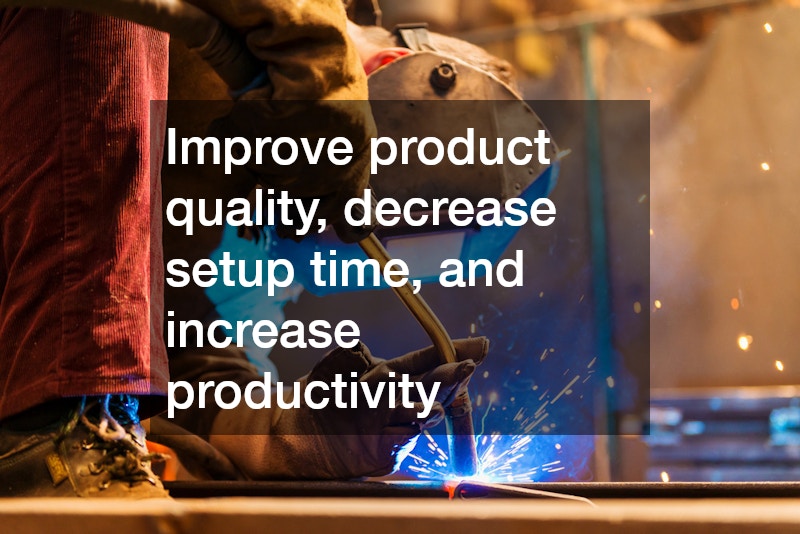Optimizing your production processes as a metalworking business is essential to maintaining efficiency, meeting the needs of customers, and remaining competitive. Streamlining your production processes can reduce costs, minimize wastage, and increase productivity. This guide will cover five tips that can help streamline production for metalworking industries. These strategies will improve your efficiency and help you achieve better results.
1. Implement Lean Manufacturing Principles
Lean manufacturing is an approach that uses a systematic process to reduce waste and maximize its value. Adopting lean manufacturing principles can improve your production process and increase efficiency. Identify non-value-added activities, such as excessive movements, overproduction, and waiting times. Implement JIT inventory management in order to reduce stock levels and eliminate excess. Track production flow using visual management systems like Kanban to minimize bottlenecks. Streamline the production layout to maximize material flow and minimize unnecessary transportation. Lean manufacturing principles can help you streamline your production and increase efficiency.
2. Invest in Modern Machinery and Technology

In the metalworking industry, investing in modern machinery and technology will help streamline production. Upgrades to your equipment will improve product quality, decrease setup time, and increase productivity. You can improve productivity by leveraging technology to streamline production processes and minimize human error.
Use these advanced machines and technology:
Robotic Systems
Since they can detect and correct errors in the production process, robotic systems are far more advanced than manual labor. Robotic systems are also more flexible in terms of manufacturing, as different robotic arms can perform various tasks. Robotics investments can increase productivity and reduce resource waste.
Automated Machines
Automated machines can be a valuable asset to the metalworking industry, as they are capable of performing complex tasks quickly, accurately, and with little human involvement. Automated machines can reduce setup time and improve the quality of your products. Automated systems also require less maintenance than traditional machinery. They are, therefore, a cost-effective option for any production process. They are also easy to program and can be customized to fit specific processes or tasks.
Computer Numerical Control Machines
CNC machines are the fastest and most efficient way to manufacture metal products. The machines are more accurate than manual processes, resulting in a better quality product. CNC machines are easy to program and require little setup time. They can also be used for different materials, sizes and shapes. By investing in CNC technology, you can dramatically increase production while decreasing lead times.
Software Solutions
You can streamline your manufacturing process from the beginning to the end with software solutions like production planning software. This software allows you to monitor and control production in real time, maximizing resources and increasing efficiency. Advanced software solutions are also programmable with algorithms to identify mistakes and suggest improvements in the production process. This technology can help you increase productivity and minimize human error.
3. Enhance Material Handling and Storage Efficiency
Metalworking industries need to optimize their material storage and handling in order to streamline production. Assess your material flow to identify improvements. By strategically organizing your workstations, you can reduce the time and distance required to transport materials. Material handling equipment such as conveyors, cranes, and forklifts can be used to ensure a smooth and efficient flow of materials. Optimize storage systems for easy access to tools, raw materials and finished products. Use inventory management techniques, such as first-in, first-out (FIFO), to minimize waste and prevent stock obsolescence.
4. Utilize Gray Iron Casting
The casting of gray iron is widely used in the metalworking industry. The process involves pouring molten metal into a mould to create complex shapes and structures. Gray iron casting is a reliable option for production, and it has several advantages. Gray iron is a good thermal conductor, which allows for faster solidification of the casting and efficient cooling. It is suitable for applications involving sliding or abrasive wearing. Gray iron casting is also machinable, making it easy to perform post-casting operations. This can help you streamline your production, produce high-quality casts, and reduce production times.
5. Foster Continuous Improvement

Metalworking industries must focus on continuous improvement to streamline production. Encourage your employees to adopt a culture of continual improvement, in which everyone takes part in identifying process improvements and implementing them. Regularly conduct process audits and measure performance to identify improvement areas. Encourage employees to make suggestions for improving processes and acknowledge their contributions. Implement a system that is formalized for tracking and implementing improvements, such as the Kaizen system. You can optimize and streamline your production processes by fostering a culture that encourages continuous improvement.
The Bottom Line
It is important to streamline production in the metalworking industry to maximize efficiency and maintain a competitive advantage. You can improve your results by implementing lean manufacturing practices, investing in new machinery and technology, optimizing storage and material handling, considering gray iron casting, and adopting continuous improvement techniques. Adapt these tips to your business’s specific needs and continually evaluate and adjust production strategies in order to remain competitive in the metalworking sector.